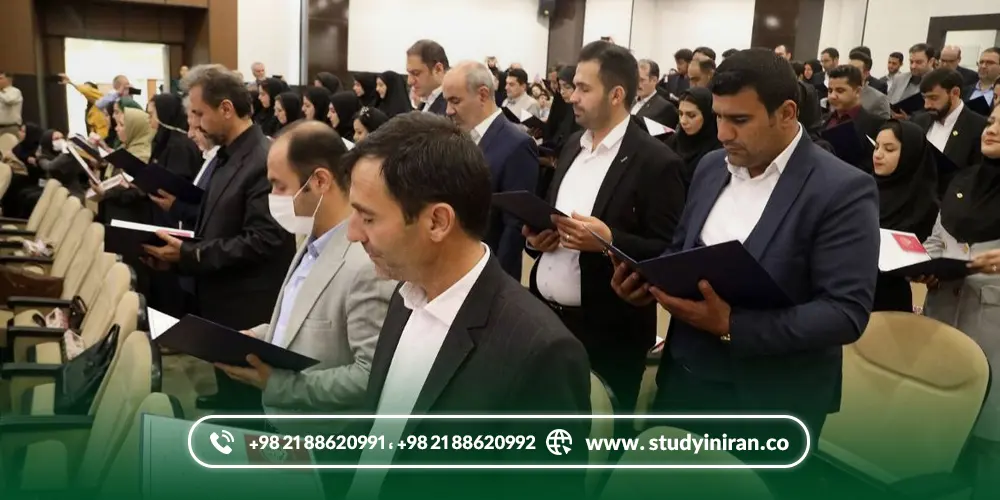- Why Study Law (LLB) in Iran?
- Law Specializations in Iran
- Top Law Universities in Iran
- Cost of Studying Law in Iran for International Students
- Admission Requirements for Law (LLB) Programs in Iran
- Study Law in Iran: Admission Requirements and Required Documents
- Law Scholarships In Iran
- Career Opportunities and Earnings After an LLB in Iran
- Final Note
- FAQs – Studying Law in Iran
Law is one of the most competitive and respected fields in Iran’s humanities programs. Students gain a solid foundation in the national legal system along with exposure to contemporary legal challenges. Courses combine theory and practice, preparing graduates for careers in law, judiciary roles, legal consulting, and public or private sector positions.
A bachelor’s degree in law is required to sit for major professional exams in Iran, including the bar, judiciary, and notary public exams. For many, it’s the essential first step toward a legal career in the country.
Why Study Law (LLB) in Iran?

Studying for an LLB in Iran offers a range of benefits for both domestic and international students:
- Strong Legal Education
Iranian universities deliver well-structured undergraduate law programs that combine theoretical foundations with practical skills for the legal profession. Many programs are designed to meet international standards, ensuring graduates are prepared for professional practice.
- Variety of Specializations
Students can focus on areas such as civil law, criminal law, international law, constitutional law, and more, building expertise that suits their interests and career plans.
- Rich Legal Heritage
Iran’s legal system blends Islamic law with civil law traditions, offering a unique perspective for those interested in comparative legal studies.
- Opportunities for International Students
Many universities welcome foreign students, and some offer LLB courses in English, making programs accessible to non-Persian speakers.
- Affordable Costs
Tuition and living expenses are significantly lower than in many Western countries, providing a cost-effective route to a quality legal education.
- Cultural Experience
Studying law in Iran also means immersing yourself in Persian culture, history, and traditions, adding a cross-cultural dimension to your education.
- Diverse Career Paths
Graduates can pursue legal careers in Iran or return to their home countries with applicable skills and knowledge.
- Expert Faculty
Law faculties are staffed with experienced professors and legal experts, providing high-quality instruction and mentorship.
- Research Potential
Iran’s distinctive legal system offers a strong platform for research in various and interdisciplinary legal topics.
- International Networking
Studying in Iran gives students the chance to connect with peers and legal professionals from around the world, building valuable professional networks.
Law Specializations in Iran
Iranian universities offer a range of LLB specializations alongside core legal studies. Availability varies by institution and faculty expertise.
University of Tehran – Public and Private Law
The country’s largest and oldest university offers a four-year LLB with options to specialize in public or private law. Tuition for international students: USD 1,000–3,000.
Shahid Beheshti University – Criminal Law and Criminology
A leading law school with a strong focus on criminal law. Four-year program. Tuition for international students: USD 1,500–3,500.
Ferdowsi University of Mashhad – International Law
Known for its academic tradition and strategic location, this university offers a four-year specialization in international law. Tuition: USD 1,200–3,000.
University of Isfahan – Family Law
Specializes in legal issues related to marriage, divorce, and custody. Four-year program. Tuition: USD 1,000–2,500.
University of Shiraz – Environmental Law
Recognized for academic and research quality, Shiraz University offers a dedicated track in environmental law. Four-year program. Tuition: USD 1,300–3,000.
Top Law Universities in Iran

Iran is home to several universities offering diverse undergraduate law programs. Each has its own areas of expertise and ranking. According to the QS World University Rankings (2021), key institutions include:
University of Tehran (QS: 581–590)
Oldest and largest in the country, offering tracks in criminal law, international law, family law, and public law.
Shahid Beheshti University (QS: 651–700)
Known for human rights law, constitutional law, and criminal law.
Ferdowsi University of Mashhad (QS: 801–1000)
Offers international law, public law, and criminal law programs.
University of Isfahan (QS: 801–1000)
Specializes in family law, environmental law, and human rights law.
University of Shiraz (QS: 1001+)
Offers Islamic law, private law, and criminal law.
University of Mazandaran (QS: 1001+)
Focuses on public law, international law, and criminal law
Allameh Tabataba’i University (QS: 1001+)
Largest humanities university in Iran, with programs in human rights, international law, and criminal law.
University of Guilan (QS: 1001+)
Offers public law, criminal law, and international law.
Al-Zahra University (Women’s University) (QS: 1001+)
Notable for programs in human rights, family law, and criminal law.
Shahid Chamran University of Ahvaz (QS: 1001+)
Offers environmental law, international law, and criminal law.
Cost of Studying Law in Iran for International Students
In addition to tuition, international students should budget for living expenses and other annual costs. Approximate yearly estimates are:
| Expense Category | Estimated Annual Cost (USD) |
| Tuition | 1,000 – 3,000 |
| Housing/Dormitory | 1,200 – 2,500 |
| Food | 1,000 – 1,800 |
| Transportation | 300 – 600 |
| Books & Supplies | 100 – 300 |
| Health Insurance | 150 – 400 |
| Other (entertainment, clothing, etc.) | 300 – 600 |
| Total Estimated Cost | 4,050 – 8,200 |
Admission Requirements for Law (LLB) Programs in Iran
To enter an undergraduate law program in Iranian universities and obtain a student visa, applicants must meet several key conditions. These requirements are generally the same for domestic and international students:
- Prerequisite Education
Applicants must have successfully completed high school or its equivalent and hold a satisfactory academic record. Taking Iran’s national university entrance exam (Konkur or Sanjesh) is mandatory.
- Entrance Exam Score
The score earned in the entrance exam is a major factor in the admission process — the higher the score, the better the chances of getting into a top university.
- Language Proficiency
Since most LLB programs in Iran are taught in Persian, applicants need to have adequate proficiency in the language. International students may need to provide proof of their language skills or take Persian language courses.
- Age Requirement
There is generally no strict age limit; applicants simply need to be of standard university entry age.
- Required Documents
- High school diploma or equivalent
- Academic transcripts
- Entrance exam results
- Language proficiency certificate (for international students)
- National ID (for Iranians) or valid passport (for international students)
- Passport-size photos
- Completed application form
- Interview (Optional)
Some universities may require an interview to assess the applicant’s motivation, communication skills, and knowledge of the field.
Study Law in Iran: Admission Requirements and Required Documents

If you are planning to study law in Iran, you must prepare a set of academic and identification documents to complete the admission process. While each university may have specific requirements, the following are the core Iran law admission requirements for undergraduate applicants:
High School Diploma
A copy of your official high school diploma or its equivalent, showing successful completion of secondary education.
High School Transcripts
An official transcript of grades, including GPA and the list of completed courses.
National Entrance Exam Results
Results of the Iranian National University Entrance Examination (Konkur or Sanjesh), which play a decisive role in the admission process for law degrees in Iran.
Persian Language Certificate (for International Students)
Most undergraduate law programs in Iran are taught in Persian. Therefore, international students must provide proof of proficiency in the Persian language through a recognized certificate or test.
Identification Documents
- Iranian applicants: National ID card
- International applicants: A valid passport
Passport-Sized Photographs
Recent photographs that meet the university’s technical specifications and admission standards.
Completed Application Form
The official application form provided by the university must be completed and signed.
Admission Interview (if required)
Some universities may conduct an interview to evaluate the applicant’s motivation, communication skills, and interest in the field of law.
Additional Supporting Documents (Optional)
In some cases, universities may request extra materials such as:
- Statement of Purpose (SOP)
- Academic recommendation letters
- Work samples (if applicable)
Applicants should always check the specific law school admission requirements in Iran before submitting their applications.
Law Scholarships In Iran
Law students in Iran—both domestic and international—can access a range of scholarships offered by universities, the government, and other organizations. These are typically awarded based on academic
merit, institutional criteria, or external sponsorship. The main types of scholarships are:
Merit-Based Scholarships
For students with high scores in the national entrance exam (Konkur or Sanjesh) or outstanding academic performance.
University Scholarships
Awarded by individual universities to top-performing law students based on grades and potential.
Government Scholarships
Offered through ministries and public agencies to support talented students in law programs.
Research & Teaching Assistantships
Paid positions that may include tuition waivers and stipends in exchange for research or teaching work.
Private Organization Scholarships
Limited opportunities provided by foundations or non-profits for strong candidates.
Career Opportunities and Earnings After an LLB in Iran
Graduates of law programs in Iran can pursue careers in both the public and private sectors, as well as in international settings. Common roles include:
1. Lawyer
Licensed attorneys work independently, in law firms, or for companies. Entry-level salaries average USD 700–1,400/month, with significant increases as experience grows.
2. Legal Advisor
Provides legal guidance to individuals and organizations. Average earnings range from USD 950–1,900/month or more, depending on expertise.
3. Judicial Officer
Works within the court system, handling cases and issuing rulings. Typical salaries range from USD 1,200–1,900/month or higher.
4. Government Legal Officer
Positions in ministries and public agencies. Pay varies widely based on role and responsibilities.
5. Legal Researcher
Employed by universities, research centers, or think tanks. Income depends on the institution and project scope.
6. Corporate Legal Counsel
Advises companies on contracts, disputes, and compliance. Monthly earnings typically range from USD 950–2,400, with potential for higher pay in large firms.
Final Note
An LLB in Iran combines solid legal training with insight into a unique legal system, preparing graduates for careers In Iran and beyond. Top universities offer varied specializations, experienced faculty, and an active academic environment.
Study in Iran provides official guidance on admissions, tuition, scholarships, and student life, helping international students plan their studies and make informed decisions for their future.
FAQs – Studying Law in Iran
Iran offers respected universities, skilled faculty, and a range of law programs. Tuition and living costs are lower than in many countries.
Yes. Some universities—especially in international law—offer English-taught programs for foreign students.
High school diploma and transcripts, entrance exam results (Konkur or Sanjesh), proof of Persian or English proficiency (for international students), valid passport, and application form
Tuition: USD 1,000–3,000 per year.
Living costs: USD 4,000–8,000 per year, including housing, food, transport, and other expenses.
Lawyer, legal advisor, judge, researcher, or corporate counsel. Income depends on role, experience, and sector.
Yes. Universities and the Iranian government offer scholarships for international students. Study in Iranlists official opportunities and requirements.
Study in Iran provides official details on admissions, fees, scholarships, and student life.






0 Reply To “Study law in Iran”